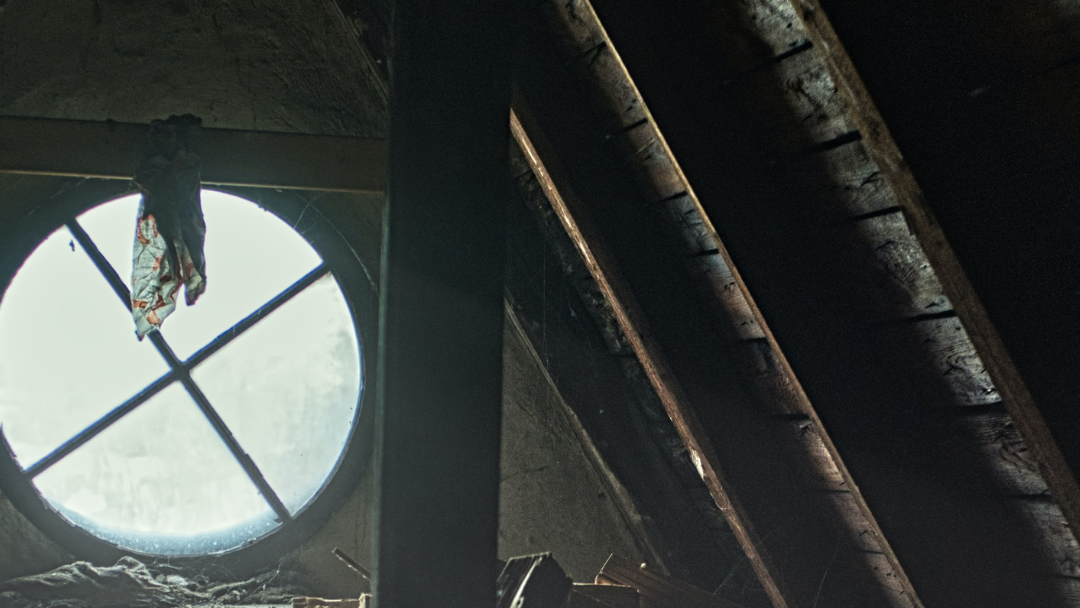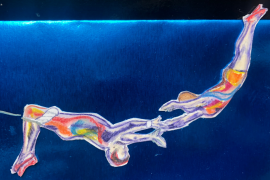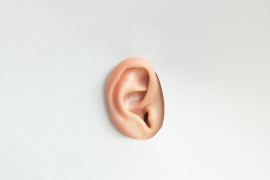WHEN GRANDMA DIED, THE FAMILY FINALLY CLEARED OUT THE HOUSE ON OSAGE. All the streets in that part of town were named for Indian tribes. She’d kept everything after Grandpa passed away, even all his clothes and toiletries. The family would sell the house, that was for sure. The neighborhood wasn’t what it had been. Granted with railyards and factories on two sides, and a cairn of mounded car batteries on a third, the neighborhood was never Edenic, but the street, which is all the neighborhood was, that street had a small-town feel. Now all the old people were gone. Their children moved away. The shotgun, tar-paper houses were falling into disrepair or burning down. The Bulgar Orthodox Church transformed into a Pentecostal church. The locally-owned supermarket was a giant beauty store. The barbershop, now “New Hope Chop Suey.” Different people were moving in. Everyone was sad.
On moving day, Ricky followed his dad to the attic.
“Smells like black mold,” Ricky’s dad said.
Ricky looked into the open door of the attic and saw a threatening darkness, like the empty parts of maps. When his dad pulled the cord on the overhead light, a harsh, almost blinding, whiteness encompassed the bulb, as if a fair-robed angel descended into this shadowy space.
Ricky’s dad hoped to find a treasure of comic books and baseball cards. Unfortunately, those were two things Grandma had already thrown out. Ricky did find some of Grandpa’s cufflinks and tie clips. One from American Steel Credit Union. Another from the Knights of Columbus. Even an art deco design pair, which gave Ricky an image of his grandpa as a bit of a dandy. Disappointed, his dad went downstairs to help Ricky’s aunts and uncles decided who would take what and what would go to Goodwill.
Ricky began to sort the attic items. There were decades of Popular Mechanic magazines. Picture frames with no pictures. Yellowed plates. Oddly shaped vases. Strange utensils, or tools, for the kitchen, the shed, the car, you couldn’t tell. A baby crib that looked too small even for a newborn. Hundreds of wire hangers. A massive crucifix that slid open to reveal a vile of holy water and two candles. Bronzed pair of baby shoes. A treasure only a scholar could value.
Ricky almost counted his exploration a bust when he saw what looked like an old board game. The corners of the box were frayed and the colors on the top faded. Ricky pushed together two heavy wooden beer crates and set the box on top. The top of the box had drawings of a white man and a black man. The name of the game was “Working Together.” Ricky put one had on each end and slowly lifted the lid. He felt like a colonial explorer uncasing the casket of a long-dead king from a long-forgotten people.
Inside were two plastic masks, one dark, one pale. Yellowed instructions crumbled underneath them. The black man’s mask was dark brown, handsome, strong featured, with a neatly-trimmed mustache. The white mask was puffier with a worn-out sag in the cheeks and bags under the eyes. Staples just beneath the ears held a rubber band to each mask. These were as much death masks as carnival masks. Nothing but curios for a makeshift museum.
When he lifted the instructions, they began to break into pieces. One fragment read, “When we work together, everyone wins.” Another, “Each man deserves his own respect.” A third, “Remember, he wants the same things that you want.” There were short plays on how to greet each other, how to discuss a work problem, how to make small talk. A cultural “must know” list with “Church life is important to him,” and, “He might have grown up in another state.” After a few minutes the disintegrated instructions littered the attic floor, as if someone had scattered ticker tape, or a handful of unconsecrated hosts.
Ricky’s dad brought some empty boxes up the stairs.
“What have you untombed?” he said.
Ricky shrugged. His dad brushed away dust from the top of the box then deciphered the fading writing.
“This was a game,” the man said, “for your grandpa. For when they started integrating the factory. The foremen had to learn how to interact with the new people. It’s an relic from another time.”
The man who had reread the past began putting things in the boxes: thick books of faded vacation photos; women’s shirts from the 1950s, probably worth something now; oddly shaped screws with no apparent use; lamps in the shapes of dark-skinned genies; an icon of Mary, Our Mother of Compassion; typical knick knacks and bric-a-bracs from a typical family on this street.
As his father packed up the family artifacts, Ricky put on the pale mask.
“Get on, git,” Ricky said with his hands on his hips. “Get to work.”
Surprised at first, his father played along.
“I’m workin’ as fast as I can, boss,” the man said.
Ricky made the motion of cracking a whip. His father laughed.
“Ah,” the man said. “Perfect.”
He put on the dark mask.
“Ah, lordly, boss,” the father said to his son. “Don’t y’all whip me.”
Ricky made the sound of a whip snapping against the air.
Both Ricky and his father were laughing.
“You two up there stop clowning,” a woman’s voice from the bottom of the stairs called. “Step and fetch it. Let’s go.”
The man in the attic frowned behind his mask.
“You hear me?” the woman said.
“I hear you,” Ricky’s dad said.
Ricky’s father took off his mask.
“Take your mask off, too,” he told his son.
Ricky began packing up the masks and instructions for the game.
“Leave that alone,” Ricky’s father said. “Let the people who come after us deal with it.”
RICHARD STIMAC has a full-length book of poetry Bricolage (Spartan Press), a forth-coming poetry chapbook Of Water and of Stone (Moonstone) and published over thirty poems in Burningword, Clackamas, december, The Examined Life Journal, Faultline, Havik (Third Place 2021 Poetry Contest), Michigan Quarterly Review, Mikrokosmos (Second Place 2022 Poetry Contest; A.E. Stallings, judge), New Plains Review, NOVUS, Penumbra, Salmon Creek Journal, Talon Review, and Wraparound South. He published flash fiction in BarBar (2023 BarBe nominee), The Blue Mountain Review, Book of Matches, Drunk Monkeys, Flash Fiction Magazine, Half and One, New Feathers, Paperbark, Prometheus Dreaming, Proud to Be (SEMO Press), On the Run, Scribble, Talon Review, The Typescript, and The Wild Word, and Transitions Sydney Hammond Memorial Short Story Anthology (Hawkeye Press). He has also had an un-staged readings by the St. Louis Writers’ Group and Gulf Coast: Playwright’s Circle, plays published in The AutoEthnographer, Fresh Words and Hive Avenue Literary Journal, a screenplay in Qu, and an essay in The Midwest Quarterly. A screenplay of his is in pre-production. He is a poetry reader for Ariel Publishing, Clepsydra, and The Maine Review.
Like what you’re reading?
Get new stories, sports musings, or book reviews sent to your inbox. Drop your email below to start >>>
NEW book release
Ghosts Caught on Film by Barrett Bowlin. Order the book of which Dan Chaon says “is a thrilling first collection that marks a beginning for a major talent.”
GET THE BOOK



